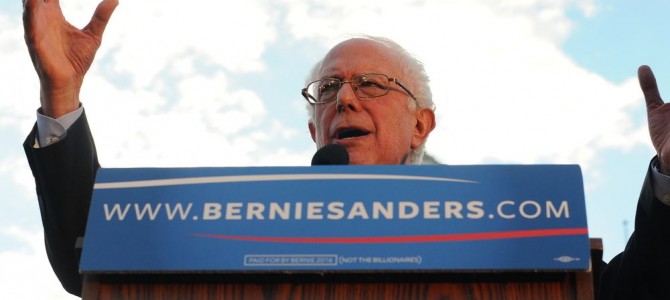You won’t find Democratic presidential candidate Bernie Sanders roaming the woods of Sherwood Forest in green tights, but the self-proclaimed socialist senator from Vermont has earned himself a reputation of being a swashbuckler of another sort: the Robin Hood of Wall Street.
“We don’t represent the interests of the billionaire class. We don’t represent corporate interests or Wall Street,” Sanders told a large crowd of supporters at the University of Massachusetts-Amherst in February, according to a report by the Boston Globe.
“The time is now. We have to summon the courage to take on the drug companies, to take on the insurance companies, to make it clear that health care is a right for all people … [we need to] rethink what it means to live in a Democratic society,” Sanders said.
Bernie Sanders’ False Claim to Robin Hood Fame
Make no mistake about it, Sanders’ grand claims are not the typical campaign promises we’ve heard from candidates in the past, and his pledge to distance himself from the nation’s richest campaign donors has attracted the attention of America’s youngest voting bloc—millennials—many of whom have been led to believe all of the world’s problems can be solved by simply confiscating the wealth of millionaires and billionaires.
A sort of legend has developed around Sanders’ bold promises, perhaps the most popular of which amongst young voters has been his plan to provide free tuition at every public college in the United States, paid for in large part by a new, heavy tax on financial markets. The tax is popularly referred to as the “Robin Hood tax.”
Sanders’ plans to redistribute wealth have evoked an image of the legendary hero of English literature, who famously battled the oppressive Prince John and sheriff of Nottingham, “taking from the rich and giving to the poor,” in an epic moral battle many of Sanders’ supporters now see being played out in Democratic primaries across America. Sanders does have a role to play in the Robin Hood narrative, but it’s not the one he envisions for himself.
Robin Hood Fought an Oppressive Government
Much debate has existed throughout history about the origins of the Robin Hood tale, but the most famous modern versions of the story, at their heart, have little to do with class warfare or stealing from the so-called “1 percent.” Robin Hood is actually about an individual, once intensely loyal to his nation, who has been forced underground by an oppressive and overpowering government that has sought to exploit its own people for the benefit of an established ruling class.
Robin Hood’s greatest enemies, Prince John and the sheriff of Nottingham, are tax-hungry tyrants, not wealthy entrepreneurs, and their antics throughout numerous versions of the Robin Hood legend should serve as a warning to Americans about the dangers of an entrenched, centralized government, not successful investors on Wall Street.
In fact, the promises made by socialists such as Sanders are not unlike those that were so commonly made by the tyrannical monarchies of the Middle Ages. Powerful rulers would solidify their strength by promising to grant neighboring communities protection, trade, or some other benefit in exchange for their freedom and a portion of their wealth.
When Robin Hood rebelled against the sheriff, tax collectors, and the monarchy, he did so not because he believed in Marxism, but because wealth in the Middle Ages was the product of a corrupt and all-powerful government. Robin Hood wasn’t battling against wealth disparities, he was fighting for the cause of individual liberty, which is precisely why many have connected the mythical rebel to the birth of the English Magna Carta, a precursor to the U.S. Constitution.
Socialism Maxes Out Cronyism
Sanders’ brand of socialism would place far greater power in the hands of an already too-powerful executive branch of government. While many candidates during the current election cycle have promised to empower the middle class at the expense of the “exploitative” rich, the plan for empowerment can simply be reduced to a nation ruled by a group of elected and unelected mini-monarchs, a merry band of thieves who effectively control every aspect of each American’s life, from the kind of health insurance policy that can be purchased to the level of fuel efficiency a motor vehicle must have.
All this, of course, is done in the name of improving the lot of society as a whole, when in fact, history has proven the only benefactors will be those fortunate enough to serve in government or be well-connected to government figures. One only needs to look to the failings of highly powerful centralized governments in cities such as Chicago, Detroit, and New Orleans to see how effective socialistic policies are at alleviating poverty.
The more one considers the legendary English hero, the more obvious it becomes the only thing Sanders’ form of socialism has in common with Robin Hood is that the promises it makes are as mythical as the sword-fighting, arrow-slinging outlaw himself.









